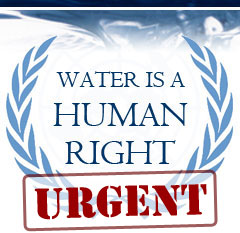Chip in to keep stories like these coming.
Five years ago this week, the United Nations adopted a historic resolution recognizing the human right to safe and clean drinking water and sanitation as “essential for the full enjoyment of the right to life.” For those of us in the balcony of the General Assembly that day, the atmosphere was tense. A number of powerful countries had lined up to oppose it, and we expected the vote to be close.
“Water is life,” said Pablo Solon, Bolivian ambassador to the UN, who introduced the resolution. He reminded the assembly that people are composed of about two-thirds water and our blood flows like a network of rivers to transport nutrients and energy to our bodies.
Ambassador Solon laid out the number of people around the world dying from lack of access to clean water. A World Health Organization (WHO) study on diarrhea showed that every three and a half seconds, a child dies of a water-borne disease in the developing world. The General Assembly fell silent as Ambassador Solon quietly snapped his fingers three times and held his small finger up for a half second.
Moments later, members voted overwhelmingly to recognize the human rights to water and sanitation. The floor erupted in cheers.
This recognition represented a breakthrough in the struggle for water justice in the world. While there are still huge obstacles, real progress has been made. Uruguay, Mexico and Egypt amended their constitutions to include the human right to water. Others, including El Salvador and the Netherlands, adopted state resolutions to the same effect.
Courts have been active as well. Botswana’s Court of Appeal cited the UN resolution to allow the Kalahari Bushmen to return to the desert and have their wells re-opened after years of abuse by the government. Indonesia’s Constitutional Court overturned a law that had allowed the private control and sale of water, citing the need to maintain access to water for all. The Bombay High Court ruled that slum dwellers have the right to water and ordered the city to provide water and sanitation to all. A French court found water cut-offs by private utilities to be unconstitutional and a violation of the right to water. Citizens in Greece and Italy have used the right to water and sanitation to stop water sell-offs in their countries.
And how are we doing in Canada? Not well. Much to my embarrassment when I served as an advisor on water to the 63rd president of the UN General Assembly, the Harper government led the fight against the UN resolution. Canada only reluctantly signed on when the right to water was included in the declaration that came out of the 2012 Conference on Sustainable Development.
With a dated and inadequate national water policy and no national standards on drinking water, Canada is no leader in the area. The federal government is responsible for water services on First Nations communities, and the situation is dire. According to the latest figures from Health Canada, there are currently 127 drinking water advisories in 88 First Nations across Canada (not including British Columbia). First Nations homes are 90 per cent more likely to be without safe drinking water and sanitation than other Canadian homes.
Shoal Lake has been providing the City of Winnipeg with its water for over 100 years, but to do so the city displaced Shoal Lake 40 First Nation, physically cutting off residents from the mainland. This has resulted in a clear violation of the human right to water and sanitation — the community has running sewage in the roads and has had to bring in bottled water for 18 years.
For municipalities needing upgrades or water infrastructure projects costing $100 million or more, the Harper government is promoting public private partnerships, in spite of the fact that rates for private water services are substantially higher and increase the trend of water cut-offs for the poor.
The Harper government has also gutted water protection laws in Canada, including the Fisheries Act, the Navigable Waters Protection Act and the Canadian Environmental Assessment Act, endangering our lakes and rivers and those who depend upon them for drinking water.
There is still so much to do in a world experiencing water shortages and increasing inequality. The human right to water must become real, and there is no place to start like home.
Maude Barlow is the National Chairperson of the Council of Canadians. She served as senior adviser on water to the 63rd president of the UN General Assembly. Her latest book is Blue Future: Protecting Water for People and the Planet Forever.
This blog post was originally published at Ricochet.
Chip in to keep stories like these coming.



